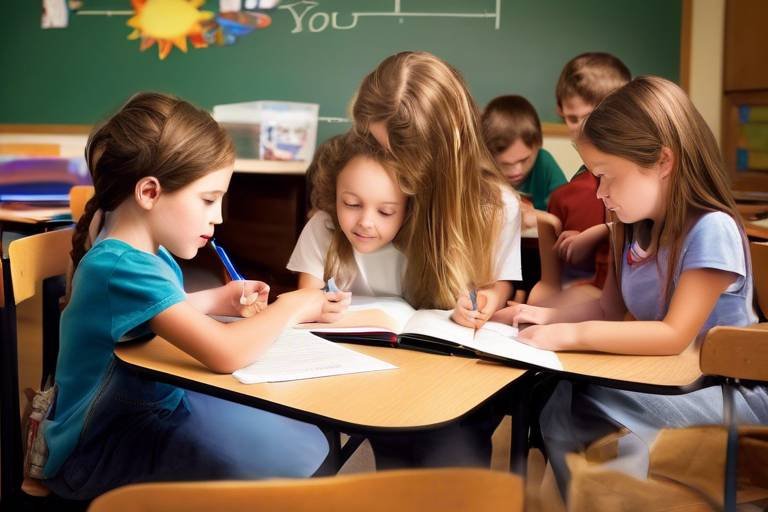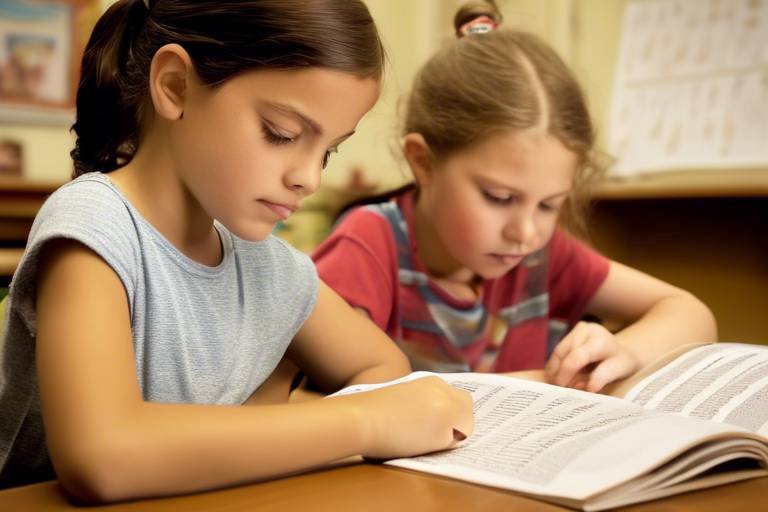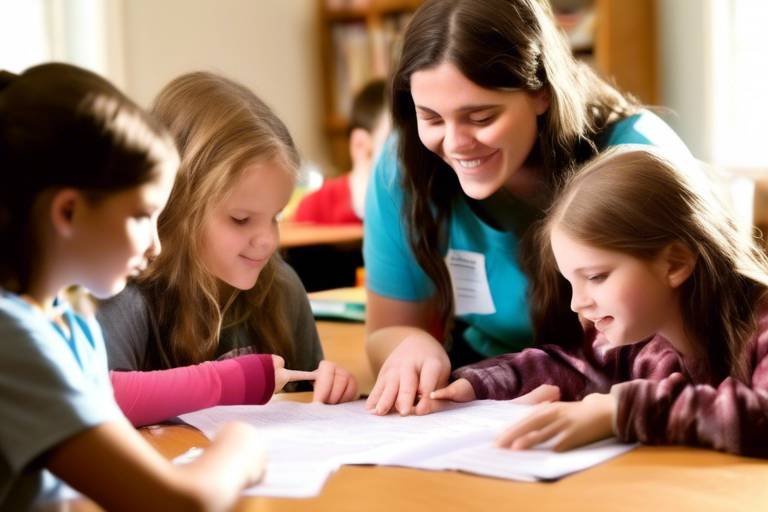Homeschooling and Social Skills: Addressing the Myths
In recent years, homeschooling has surged in popularity, with more families opting for this educational route to cater to their children's unique learning needs. However, amidst this rise, a cloud of misconceptions looms, particularly regarding the social skills of homeschooled children. Many people wonder: Are homeschooled kids really missing out on social interactions? Or do they possess the same—or even superior—social skills as their traditionally schooled peers? This article dives deep into the myths surrounding homeschooling and social skills, providing a clearer picture for parents, educators, and anyone curious about this alternative educational approach.
Homeschooling is not a monolithic concept; it encompasses a variety of approaches, from structured curricula to unschooling methods that allow children to explore their interests freely. Unlike traditional schooling, which often follows a rigid schedule and curriculum, homeschooling provides families with the flexibility to tailor their educational experiences. This adaptability can significantly influence not only academic performance but also social interactions. With this foundation, we can now address the common myths that cloud the perception of homeschooled children's socialization.
One of the biggest concerns parents have about homeschooling revolves around socialization. There are several myths that perpetuate the belief that homeschooled children are socially inept or isolated. Let’s unpack these misconceptions and shed light on the reality of social interactions for homeschooled kids.
Many people hold the belief that homeschooled children are confined to their homes, leading to a lack of social interactions. However, this couldn't be further from the truth. In reality, homeschooled children often engage in a wide range of social activities that provide ample opportunities to connect with peers. From joining local sports teams to participating in community theater, the social life of a homeschooled child can be vibrant and fulfilling.
Homeschooled children frequently participate in community events, which serve as platforms for building friendships and social networks. These activities can include:
- Sports leagues
- Art classes
- Volunteer opportunities
- Field trips with other homeschooling families
Such involvement not only fosters social connections but also instills a sense of belonging and community engagement.
Homeschooling allows for flexible arrangements that enable children to interact with peers in varied settings. Unlike traditional school environments, where social interactions can sometimes feel forced or superficial, homeschooling can cultivate more meaningful relationships. Children can meet friends at parks, co-op classes, or even during family outings, allowing them to build friendships based on shared interests and activities.
Another prevalent myth is that homeschooling restricts the development of social skills. However, this notion fails to recognize the unique advantages that homeschooling can offer. In fact, the personalized nature of homeschooling allows parents to focus on their child's specific social needs and learning styles. This can lead to enhanced social skills, as children learn to navigate various social situations in a supportive environment.
When it comes to social skills, homeschooling can provide numerous benefits that traditional schooling may not offer. Let's explore some of these advantages that can positively influence a child's ability to interact with others.
One of the greatest strengths of homeschooling is the ability to create customized learning environments. Parents can design lessons and activities that cater to their child's interests, strengths, and areas for improvement. This personalized approach not only enhances academic learning but also encourages children to engage socially in ways that feel comfortable and natural to them.
Homeschooling often opens the door to real-world experiences that are integral to developing practical social skills. Whether it’s visiting a museum, attending a workshop, or participating in community service, these experiences provide children with the chance to interact with diverse groups of people. Through these interactions, they learn essential skills such as communication, teamwork, and empathy, which are crucial for navigating social landscapes.
Q: Do homeschooled children have friends?
A: Absolutely! Homeschooled children often have a variety of friends from different activities, clubs, and community events.
Q: How do homeschooled kids learn social skills?
A: They learn social skills through interactions in various settings, including community activities, sports, and group classes.
Q: Is homeschooling better for socialization than traditional schooling?
A: It depends on the child and the family's approach. Many homeschooled children thrive socially, while others may benefit from more structured environments.

Understanding Homeschooling
Homeschooling is an educational approach that has gained significant traction in recent years, and for good reason! It offers a unique alternative to traditional schooling, allowing parents to take charge of their children's education in a way that aligns with their family values and individual learning styles. Rather than being confined to a classroom, homeschooled children often learn in diverse environments, from the comfort of their own homes to community centers, libraries, and even nature parks. This flexibility can lead to a more personalized and engaging learning experience.
There are various approaches to homeschooling, each catering to different educational philosophies and family needs. Some families may choose a structured curriculum that mirrors traditional schooling, while others may adopt a more relaxed, child-led learning style. This adaptability is one of the key benefits of homeschooling, as it allows parents to tailor their teaching methods to suit their child's unique interests and strengths. For instance, a child passionate about science can dive deep into experiments and field trips, while another who loves literature can explore classic novels and creative writing.
One of the most significant differences between homeschooling and traditional schooling is the level of parental involvement. In a traditional school setting, teachers manage classrooms of multiple students, which can limit the amount of individual attention each child receives. In contrast, homeschooling enables parents to engage directly with their child's learning process, fostering a deeper understanding of their educational needs. This one-on-one interaction can create a strong bond between parent and child, making education a collaborative and enjoyable journey.
However, it's essential to recognize that homeschooling is not without its challenges. Parents must be willing to invest time, energy, and resources into their child's education, which can be daunting. Additionally, there may be concerns about socialization and whether homeschooled children will develop the necessary social skills to thrive in society. But fear not! Many families find that with a little creativity and planning, homeschooling can provide ample opportunities for social interaction and skill development.
In conclusion, understanding homeschooling is about recognizing its potential to create a tailored educational experience that meets the needs of each child. It’s a journey filled with both challenges and rewards, enabling families to explore the world of learning together. As we delve deeper into the myths surrounding homeschooling, it becomes clear that the concerns regarding social skills are often based on misconceptions that can be effectively addressed.

Common Myths About Socialization
When it comes to homeschooling, there's a lot of chatter surrounding the socialization of children. Many people assume that homeschooled kids are missing out on crucial social interactions, but this couldn't be further from the truth. The prevailing myths often stem from a lack of understanding about what homeschooling truly entails and how it functions in practice. So, let’s dive into some of the most common myths regarding socialization and clear the air!
One of the biggest misconceptions is that homeschooled children are isolated and lack social interactions. In reality, many homeschooled kids are involved in a variety of social settings. They participate in community activities, sports, clubs, and even co-ops where they can meet and interact with peers. The flexibility of homeschooling allows families to choose how and when their children engage with others, often leading to richer and more diverse social experiences.
Homeschooled children often take part in community events, which can range from local festivals to volunteering opportunities. These activities not only allow them to meet new friends but also help them develop a sense of community and responsibility. For instance, many families participate in organized sports leagues or art classes that bring together children from various backgrounds. This involvement can lead to friendships that extend beyond the classroom, providing a well-rounded social experience.
Another advantage of homeschooling is the ability to tailor social interactions. Unlike traditional schools where children are often confined to a single classroom with the same peers, homeschooled kids can interact with a broader range of individuals. They might join clubs that align with their interests, attend workshops, or even participate in field trips with other homeschooling families. This flexibility promotes meaningful relationships and helps children develop social skills in various settings.
Another prevalent myth is that homeschooled children don't develop social skills effectively. It's essential to recognize that social skills can be nurtured in many environments, not just in a traditional classroom. In fact, homeschooling can provide tailored learning experiences that enhance these skills uniquely. For example, engaging in discussions with parents, participating in group activities, and navigating real-world situations can all contribute to a child's social development.
Ultimately, the idea that homeschooled children lack socialization opportunities is a misconception that needs to be addressed. By debunking these myths, we can better understand the rich social lives that many homeschooled children lead.
- Do homeschooled kids have friends? Yes, homeschooled children often have friends from various activities, clubs, and community events.
- How do homeschooled children socialize? They socialize through sports, co-ops, community events, and other extracurricular activities.
- Are social skills better developed in homeschooled children? Many parents report that their homeschooled children develop strong social skills due to diverse interactions and real-world experiences.

Myth 1: Homeschooled Kids Are Isolated
One of the most persistent myths surrounding homeschooling is the belief that homeschooled children are isolated from their peers and the broader community. This misconception often stems from a lack of understanding about how homeschooling works and the diverse opportunities available to these children. In reality, many homeschooled kids are far from isolated; they are actively engaged in a variety of social activities that foster meaningful interactions and friendships.
To illustrate this point, consider the many ways homeschooled children can participate in their communities. While traditional school settings often limit social interactions to a classroom environment, homeschooling opens up a world of possibilities. For instance, homeschooled children frequently join community groups, sports teams, and clubs that align with their interests. Whether it’s participating in a local soccer league or joining a book club at the library, these activities provide ample opportunities for socialization.
Additionally, many homeschooling families collaborate with one another to create social networks. They often organize group outings, field trips, and co-op classes, allowing children to learn and play together. This collaborative approach not only combats the notion of isolation but also fosters a sense of community among both parents and children.
Furthermore, the flexibility of homeschooling allows for varied peer interactions. Instead of being confined to a single group of classmates, homeschooled children can interact with a broader range of peers from different backgrounds and age groups. This exposure helps them develop stronger social skills and adaptability, as they learn to communicate and collaborate with others in diverse settings.
In summary, the idea that homeschooled kids are isolated is a myth that does not hold up against the reality of their social lives. Through community involvement, flexible peer interactions, and collaborative learning opportunities, homeschooled children can cultivate rich social experiences that enhance their development. It's essential for parents and educators to recognize and dispel this myth, showcasing the vibrant social world that many homeschooled children thrive in.

Community Involvement
When it comes to the social lives of homeschooled children, one of the most significant misconceptions is that they live in a bubble, cut off from the world around them. However, the reality is quite the opposite! Many homeschooled kids actively participate in their communities, engaging in a variety of activities that foster social connections and friendships. For instance, they might join local sports teams, participate in community theater, or attend art classes. These opportunities not only help them develop crucial social skills but also allow them to form meaningful relationships with peers from diverse backgrounds.
In fact, homeschooling often encourages families to seek out community resources that can provide enriching experiences. Many parents take advantage of local homeschool co-ops, where children can collaborate on projects, share learning experiences, and engage in group activities. These co-ops can serve as a fantastic platform for children to practice teamwork and communication skills, which are essential in any social setting. Moreover, homeschooled children often volunteer in community service projects, which not only instills a sense of responsibility but also allows them to interact with a wide range of people.
Here’s a quick look at some common forms of community involvement for homeschooled children:
- Sports Teams: Many homeschooled kids join local leagues where they can play soccer, basketball, or even martial arts, helping them learn about teamwork and sportsmanship.
- Clubs and Organizations: From scouting groups to 4-H clubs, there are numerous organizations where homeschooled children can meet peers and develop leadership skills.
- Community Events: Participating in fairs, festivals, or local parades gives children a chance to socialize while contributing to their community.
- Arts and Crafts Classes: Many communities offer art classes that allow children to express themselves creatively while interacting with others.
In essence, community involvement is a vital aspect of the homeschooling experience, providing children with the chance to step outside their homes and engage with the world. By participating in various activities, homeschooled children not only build their social networks but also gain confidence and practical skills that will serve them well throughout their lives. So, the next time someone mentions that homeschooled kids are isolated, remind them that these children are often out there, making friends and learning valuable lessons in the heart of their communities!
Q: Do homeschooled children have opportunities to socialize?
A: Absolutely! Homeschooled children often engage in various community activities, sports, and clubs that provide ample opportunities for socialization.
Q: How do homeschooled kids make friends?
A: They can make friends through local co-ops, community events, sports teams, and extracurricular activities, just like children in traditional schools.
Q: Are homeschooled children more socially awkward?
A: Not necessarily. Social skills can be developed in various environments, and many homeschooled kids thrive in social settings, often having more diverse interactions than their peers in traditional schools.

Peer Interactions
When it comes to the social lives of homeschooled children, one of the biggest misconceptions is that they miss out on peer interactions. This couldn't be further from the truth! In fact, homeschooling often provides a unique opportunity for children to engage with their peers in a variety of settings. Unlike traditional school environments, where interactions are often limited to the classroom and schoolyard, homeschooled kids can explore a broader spectrum of social experiences.
Imagine a world where your child can choose when and how to socialize! Homeschooled children have the flexibility to participate in activities that genuinely interest them. Whether it's joining a local sports team, attending community theater, or participating in science clubs, the options are vast. This flexibility allows children to connect with peers who share similar interests, fostering deeper and more meaningful relationships.
Moreover, homeschooling encourages families to seek out social opportunities outside of the conventional school setting. Many homeschooling families actively network with other homeschoolers, organizing group activities, field trips, and co-op classes. For instance, a group of homeschooling families might come together for a weekly science experiment or a monthly book club. These gatherings not only provide educational benefits but also create a rich social tapestry where children can interact and form friendships.
Additionally, the diverse environments in which homeschooled children learn can significantly enhance their social skills. They often find themselves in various social contexts, from museums and libraries to parks and community centers. This exposure helps them adapt to different social dynamics, improving their ability to communicate and connect with others. For example, a child who regularly attends community workshops will learn to engage with a wide range of people, from instructors to fellow participants, honing their conversational skills in real-world situations.
In essence, the idea that homeschooled children are isolated is a myth that simply doesn't hold water. The reality is that with a little creativity and initiative, homeschooling can lead to a vibrant social life filled with diverse interactions. So, the next time someone mentions the socialization of homeschooled kids, you can confidently share how these children are not just surviving but thriving in their social environments!
- Do homeschooled children have enough opportunities to socialize? Yes! They often engage in various activities, clubs, and community events that provide ample social interaction.
- How do homeschooled children make friends? They can join local groups, sports teams, or co-op classes where they meet peers with shared interests.
- Are there any studies on the social skills of homeschooled children? Yes, research indicates that homeschooled children often develop strong social skills, thanks to their diverse interactions and experiences.

Myth 2: Limited Social Skills Development
One of the most persistent myths surrounding homeschooling is the belief that it somehow limits a child's development of social skills. This misconception arises from a simplistic view of socialization, often equating it with merely being in a classroom full of peers. However, the reality is far more nuanced. In fact, homeschooling can offer a unique environment that fosters social skills in ways traditional schooling may not. By allowing children to engage with a variety of people in different contexts, homeschooling can actually enhance their social development.
When we think about social skills, we often picture children interacting in a school setting, but this is just one aspect of socialization. Homeschooled children frequently participate in a wide range of activities that encourage social interaction. For instance, they might join community sports teams, attend art classes, or participate in local clubs. These experiences provide them with opportunities to meet peers from diverse backgrounds and learn to navigate various social situations.
Moreover, homeschooling allows for a tailored approach to social skills development. Parents can identify their child's unique social needs and create opportunities that align with their interests. For example, if a child is shy, parents can arrange smaller group interactions to help build confidence before introducing them to larger gatherings. This kind of individualized attention can lead to a more profound understanding of social cues, empathy, and effective communication.
Additionally, the flexibility of homeschooling means that children can engage in real-world experiences that are crucial for developing practical social skills. They can visit museums, attend workshops, and volunteer in their communities—all of which provide invaluable lessons in interacting with others. These experiences often lead to more meaningful relationships and a deeper understanding of the world around them.
To illustrate this point, consider the following table that highlights various socialization opportunities for homeschooled children:
| Activity | Description | Social Skills Developed |
|---|---|---|
| Community Sports | Joining local teams fosters teamwork and communication. | Collaboration, conflict resolution, and leadership. |
| Art Classes | Group art projects encourage creativity and sharing ideas. | Creativity, expression, and interpersonal skills. |
| Volunteering | Engaging in community service promotes empathy and social responsibility. | Empathy, teamwork, and problem-solving. |
Ultimately, the notion that homeschooling limits social skills development is not only misleading but also overlooks the myriad ways in which homeschooled children can thrive socially. By providing tailored learning experiences and real-world interactions, homeschooling can equip children with the social tools they need to succeed in life. So, the next time someone mentions this myth, remember that socialization is not confined to the walls of a classroom; it's a rich tapestry woven from diverse experiences and interactions.

Benefits of Homeschooling for Social Skills
When it comes to homeschooling, many people often focus on academics, but the truth is, the benefits extend far beyond just the curriculum. One of the most significant advantages is the positive impact it can have on a child's social skills. Unlike traditional schooling, where children are confined to a classroom with the same peers day in and day out, homeschooling offers a unique opportunity for children to engage in a variety of social settings. Imagine a world where learning happens not just through textbooks but through real-life experiences and interactions!
One of the key benefits of homeschooling is the customized learning environment. Each child is unique, and homeschooling allows parents to tailor the educational experience to fit their child's specific needs. This individual approach means that parents can focus on developing their child's social skills in a way that resonates with them. For instance, if a child is shy, parents can create opportunities for them to interact with others in low-pressure environments, gradually building their confidence. This personalized attention often leads to stronger social connections and a deeper understanding of social cues.
Moreover, homeschooling encourages real-world experiences. Unlike the traditional classroom, where lessons can sometimes feel detached from reality, homeschooled children often learn through hands-on activities. Whether it's going on field trips, participating in community service, or joining local clubs, these experiences allow children to practice their social skills in authentic settings. For instance, a visit to a local museum can turn into a discussion about art and history, while a community service project can teach teamwork and empathy. These interactions are invaluable as they help children develop practical social skills that are essential for navigating the world.
Furthermore, homeschooling often opens doors to diverse social interactions. Homeschooled children are not limited to their immediate neighborhood or school district. They can connect with peers through various groups, such as sports teams, art classes, or co-op programs. This exposure to different personalities and backgrounds enriches their social development and fosters a sense of community. In fact, many homeschooling families actively seek out social opportunities, ensuring their children have a well-rounded social experience. It’s like being part of a vibrant tapestry of interactions, where each thread contributes to the overall picture of social competence.
In addition to these opportunities, homeschooling cultivates a sense of independence and responsibility in children. They often take charge of their learning, which can instill a sense of confidence. This self-assuredness translates into social situations, where children feel more comfortable initiating conversations and forming friendships. The ability to express oneself clearly and confidently is a crucial social skill that many homeschooled children develop more readily, thanks to their unique learning environment.
In summary, the benefits of homeschooling for social skills are profound and multifaceted. From customized learning experiences to real-world interactions, homeschooling equips children with the tools they need to thrive socially. By breaking away from the traditional school model, families can create a rich, engaging environment that fosters not only academic growth but also the development of essential social skills. It’s a win-win situation, where the focus is not just on what children learn, but also on how they connect with the world around them.
- Do homeschooled children lack social skills? No, many homeschooled children engage in various social activities that enhance their social skills.
- How do homeschooled children interact with peers? They participate in community events, sports, and clubs, allowing for diverse peer interactions.
- Can homeschooling help shy children develop social skills? Yes, homeschooling provides tailored opportunities to help shy children build confidence in social situations.
- Are there any drawbacks to homeschooling regarding socialization? While some may argue there are drawbacks, many homeschooled children thrive socially through diverse experiences.

Customized Learning Environments
One of the most compelling advantages of homeschooling is the ability to create tailored specifically to a child's unique needs and preferences. Imagine walking into a classroom designed just for you, filled with materials and activities that ignite your passion for learning. This is the reality for many homeschooled children, who benefit from a personalized approach that traditional schools often struggle to provide. By focusing on individual learning styles, homeschooling allows children to thrive in ways that resonate with them.
In a traditional classroom setting, teachers often have to cater to a diverse group of students, which can lead to a one-size-fits-all approach. However, in a homeschooling environment, parents can adjust the curriculum and teaching methods to fit their child's interests, strengths, and challenges. For instance, if a child is particularly fascinated by science, a parent can incorporate hands-on experiments and field trips to science museums, making learning not just educational but also exciting and engaging.
Furthermore, the flexibility of homeschooling allows for the integration of real-world experiences into the learning process. Children can learn about economics by running a small business, or they can develop their social skills by volunteering in the community. This kind of experiential learning fosters not only academic growth but also enhances social interactions, as children engage with people of different ages and backgrounds. The opportunities for socialization are abundant and often more genuine than what is experienced in a traditional school setting.
To illustrate the impact of customized learning environments on social skills, consider the following table that compares traditional schooling with homeschooling:
| Aspect | Traditional Schooling | Homeschooling |
|---|---|---|
| Curriculum Flexibility | Standardized curriculum for all students | Tailored curriculum based on child's interests |
| Learning Pace | Set pace for the entire class | Individual pace, allowing for mastery of subjects |
| Social Interaction | Limited to peers in the classroom | Diverse interactions through community activities |
| Real-World Application | Focused on theoretical knowledge | Emphasis on practical skills through real-life experiences |
This table demonstrates how homeschooling can create a more supportive and enriching environment for children, particularly when it comes to developing their social skills. By learning in a customized setting, children can explore their interests deeply, engage with their communities, and build friendships that are meaningful and lasting.
Ultimately, the ability to customize learning environments in homeschooling not only fosters academic success but also cultivates strong social skills. With the right approach, homeschooled children can emerge as well-rounded individuals, equipped with the confidence and social acumen necessary to navigate the world around them. So, if you're considering homeschooling, remember that it's not just about academics; it's about creating a rich, interactive, and socially vibrant learning experience.
- Do homeschooled children miss out on socialization opportunities?
No, homeschooled children often engage in a variety of social activities through community events, sports, and clubs. - How can parents ensure their homeschooled children develop social skills?
Parents can facilitate social interactions by encouraging participation in group activities, sports, and community service. - Is homeschooling suitable for every child?
While many children thrive in a homeschooling environment, it's essential to consider each child's unique needs and learning style.

Real-World Experiences
One of the most significant advantages of homeschooling is the ability to immerse children in that foster social skills. Unlike traditional schooling, where children often spend hours confined to a classroom setting, homeschooled children have the flexibility to learn from their surroundings. Imagine a child learning about ecosystems not just from a textbook, but by visiting a local nature reserve, interacting with park rangers, and engaging in hands-on activities like planting trees or observing wildlife. This kind of experiential learning not only enhances their understanding of the world but also provides them with opportunities to interact with diverse groups of people.
Moreover, homeschooling allows for tailored experiences that align with a child's interests. For instance, a child passionate about art can spend time in local galleries, participate in workshops, and even collaborate with local artists. These interactions are invaluable, as they help children develop confidence and communication skills in various social contexts. Instead of being limited to interactions with a small group of peers, homeschooled children often engage with a broader community, creating a rich tapestry of social connections.
Additionally, many homeschooling families actively seek out community involvement, which can range from volunteering at local shelters to participating in community sports leagues. These activities not only help children build friendships but also teach them the importance of teamwork and cooperation. For example, when a homeschooled child joins a soccer team, they learn to work with others towards a common goal, navigate conflicts, and celebrate successes together. Such experiences are crucial for developing social skills that are essential in adult life.
In essence, the real-world experiences that homeschooling offers can significantly enhance a child's social development. By stepping out of the confines of a traditional classroom, children are not just learning academic content; they are also gaining essential life skills that will serve them well into adulthood. The world becomes their classroom, and every interaction is a lesson in socialization.
- Do homeschooled children lack socialization opportunities?
Not at all! Homeschooled children often engage in various community activities, sports, and clubs that provide ample social interaction. - How can homeschooling enhance social skills?
Homeschooling allows for customized learning experiences and real-world interactions, which can significantly improve a child's social abilities. - Are there support groups for homeschooling families?
Yes, many communities offer support groups that provide resources, social opportunities, and a sense of community for homeschooling families.
Frequently Asked Questions
- Do homeschooled children lack social interaction?
No way! Homeschooled kids actually engage in a variety of social activities. They participate in community events, sports, and clubs, which allow them to meet and interact with peers outside of a traditional classroom setting.
- How do homeschooled children develop social skills?
Homeschooling offers tailored learning experiences that can enhance social skills. Children can interact with different age groups in various environments, helping them develop important communication and interpersonal skills.
- Are there any benefits to homeschooling for social skills?
Absolutely! Homeschooling allows for customized learning environments that cater to a child's unique social needs. Plus, real-world experiences can boost their confidence and help them navigate social situations more effectively.
- What types of community involvement do homeschooled children have?
Homeschooled children can get involved in numerous community activities such as volunteering, joining local sports teams, and participating in clubs or classes that interest them. This involvement helps them build friendships and develop social networks.
- Can homeschooling lead to limited peer interactions?
Not at all! Homeschooling often allows for flexible arrangements that encourage peer interactions in diverse settings. This flexibility can lead to more meaningful relationships compared to traditional school environments.
- How does homeschooling help with real-world social skills?
Homeschooling provides opportunities for children to engage in real-world situations, such as grocery shopping or attending community events. These experiences are invaluable for developing practical social skills and confidence in various environments.



















